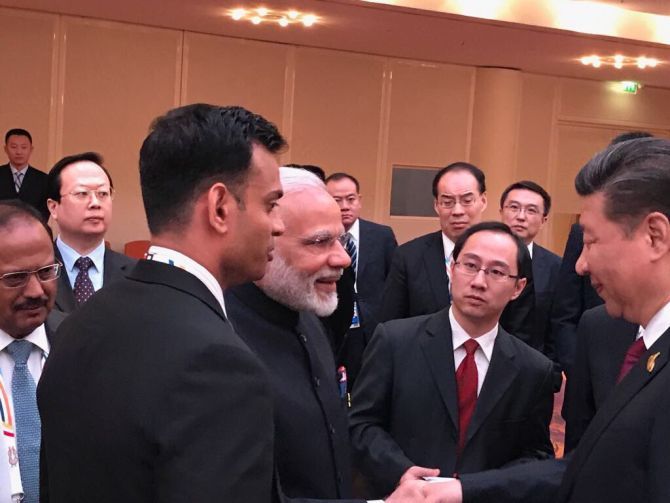 | « Back to article | Print this article |
'The impasse on the India-China border in the Sikkim sector persists, but the Hamburg meeting between the two leaders will certainly have its salutary effects on the relationship between the two countries,' says China scholar Rup Narayan Das.

What stole the limelight at the G-20 meeting in Hamburg were not the deliberations at the summit, but the bilateral meetings of world leaders to discuss issues of bilateral interest.
Such bilateral meetings on the margins of multilateral meetings are increasingly assuming great significance the world over in terms of strategic communication, particularly when there is a diplomatic or military impasse between two countries.
At times diplomats find it difficult to work out summit meetings and structured dialogues between heads of State or government due to constraints of protocol and paucity of time and the nitty-gritty that they involve.
It is against this backdrop that the sideline meetings create the atmospherics for an informal meeting between and among leaders.
As far as India is concerned the stalemate on the India-China border in the Sikkim sector had created much anxiety about the possibility of a meeting between Prime Minister Narendra D Modi and Chinese President Xi Jinping in Hamburg.
Modi sprang a surprise when he reached out to Xi. India's ministry of external affairs tweeted that a 'range of issues' were discussed between the two leaders.
The niceties of diplomatic protocol suggests that it could not have been an impromptu meeting.
The presence of a Chinese-knowing Indian diplomat to translate the conversation from Chinese to English and vice versa suggests that New Delhi had already worked out the feasibility of a conversation between the two leaders.
Later, when MEA Spokesperson Gopal Baglay was asked to elaborate on the conversation, he replied that a picture spoke more than thousand words.
The photograph of the meeting, which the MEA tweeted, exuded personal chemistry and bon homie between the two leaders.
While Modi looks at Xi with warmth and confidence, the acquiescence of the Chinese leader's gesture is very evident.
The meeting, which lasted seven minutes or so, was extensively reported in the Indian media along with the photograph of the two leaders shaking hands.
Earlier, the Chinese media had reported that the atmosphere was not right for a Modi-Xi meeting at the Hamburg summit.
When there are some issues in a relationship between two countries, such a bilateral meeting on the sidelines of a summit becomes all the more necessary.
Leaders of countries always meet on the sidelines of multilateral meetings not only to exchange pleasantries, but also discuss serious bilateral issues.
Then prime minister Dr Manmohan Singh met his Chinese counterpart on the sidelines of the ASEAN summit in Bali at the height of the spat over the South China Sea.
Dr Singh told the Chinese leader that India's foray into the South China Sea was purely for commercial reasons and articulated India's stance on the issue. The meeting helped somewhat defuse the tension between the two countries.
Last month Modi met Xi on the sidelines of the Shanghai Cooperation Organisation where India was formally admitted into the six member organisation.
Modi and Xi share a very good rapport which they have built over the last three years and over their many encounters.
Modi departed from the tradition of receiving a visiting dignitary in New Delhi and welcomed Xi in Ahmedabad in September 2014. Xi reciprocated the gesture when he received Modi in his hometown of Xi'an in May 2015.
Receiving Modi, Xi said, 'You received me very warmly in your hometown. I am very glad to receive you in my home town. This is the first time I have received a foreign leader in my hometown.'
The impasse on the India-China border in the Sikkim sector persists, but the Hamburg meeting between the two leaders will certainly have its salutary effects on the relationship between the two countries.
It is difficult not to speculate that the two leaders would not have taken cognisance of what is happening on the India-China border.
One need not unduly over-react to what appears in the Chinese media. These are reflections of Chinese nationalism at a time when both India and China have emerged as strategic rivals on the world stage and also in the regional context.
The relationship between India and China is passing through a churning and it will take time for the equilibrium between the two countries to be established.
The media in both countries must show restraint. Adverse comments and reportage will only harden people's perceptions.
Dr Rup Narayan Das is a former senior fellow at the Institute for Defence Studies and Analyses. The views expressed are personal.